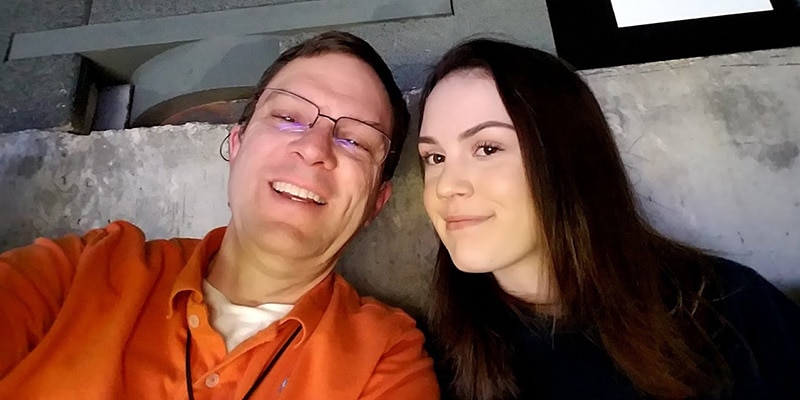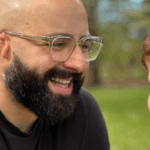MED-EL
Published Dec 02, 2019
From Hearing Aids To Cochlear Implants: Rod’s Story

Rod had used hearing aids for over 40 years before getting cochlear implants a few years ago. Find out what made him make the change, and how cochlear implants have changed his hearing for the better.
Hi, I’m Rod, a 50-year-old man who was born in Winchester, Virginia in the United States. I spent the first 22 years of my life in Virginia, where I also graduated from the University of Virginia with a degree in Computer Science. Since then, I have lived in the Charlotte, North Carolina area, where I met my wife Leigh.
Leigh and I have a 15-year-old daughter and a 13-year-old son. I have worked as a software engineer for several organizations. I invest my time outside of work into my family, my church, and keeping myself reasonably fit.
When did you first find out you had hearing loss?
I have been severely hearing impaired in both ears since birth, though that wasn’t discovered until I was two years old. I was fitted with my first hearing aids when I was three years old and wore hearing aids from then until I had both ears implanted at age 48.
My hearing loss from about age 10 was around 80 dB in both ears with minimal hearing about 2500 Hz. I lost more hearing when I was ten years old and so I was hospitalized for two weeks at Johns Hopkins in Baltimore for extensive testing. As far as I know, the tests were inconclusive but from then on I needed the most powerful hearing aids to compensate for my loss.
Hearing aids helped me hear voices as well as sounds from the environment. However, I could hear next to nothing without my hearing aids. I could lip read (though with no formal training). I never did learn sign language since none of my family, friends, classmates and/or coworkers know it.
What was it like growing up with hearing loss?
Most adults and my friends and family were gracious and patient with my hearing impairment—they would repeat or write things down if I did not understand. I did not have any issues with my childhood friends related to hearing impairment.
I attended a deaf-oriented kindergarten followed by a special education school for first grade. Thereafter I was mainstreamed—though with small class sizes— so I attended a parochial school for the rest of my elementary education and then a small private school for middle and high school.
I did have trouble with some fellow students at school, especially in middle and high school. A few boys mocked my handicap and different speech, or bullied me.
Which situations did you find the hardest with your hearing aids?
Since I could not wear hearing aids in water, I could not communicate with people when swimming or taking part in water-oriented activities. Also, I was not athletic as a kid, in part because it is hard to play team sports when you cannot understand your teammates. Then, as now, I preferred “individual” sports such as hiking, backpacking, and skiing.
As an adult, I had trouble communicating with family, friends, and coworkers in noisy environments. Talking on the phone was also challenging, especially with strangers whose voice is unfamiliar to me. Starting in the 1990s I began using a headset in conjunction with the T-coil/loop so I could listen without the external background noise. I still do that today using the ClearSounds Quattro.
When did you first start thinking about cochlear implants?
I started researching it in the summer of 2015. I had known about cochlear implants since the late 1990s. I wanted to improve my hearing for the second half of my life and so I could communicate with people. I decided I was comfortable with the technology.
When I first began to investigate cochlear implants, I visited my local ENT physician. He was not supportive of cochlear implants for me. He essentially said, “Why get cochlear implants when you are doing just fine with hearing aids?”
A few days later I had my regularly scheduled yearly wellness appointment with my primary care practitioner, Dr. Daniel Aquino. I discussed cochlear implants with him. He has a son who is hearing impaired and received cochlear implants from the UNC Chapel Hill ENT/Audiology department. Dr. Aquino urged me to press on and connected me with Dr. Harold Pillsbury and audiologists such as Dr. Andrea Bucker at UNC Chapel Hill.
What has been the biggest change since getting a cochlear implant?
The biggest change is being able to hear the high frequencies. For instance, I can hear the “s” sound. When the implants were first activated, the “s” sound was startlingly loud. I can hear running water. I can hear birds and other animals outside. I can hear lyrics in music much more than before.
People’s voices are louder and clearer. I can listen better than before in noisy situations. My audiologist tested me for comprehension with hearing aids before the implants with just 5dB difference between background noise and the talker—I correctly repeated just 3%. At the latest test in January (2 years after implants), my comprehension was 50%—a remarkable improvement!
What did your friends and family think about your implant?
My family, friends, and coworkers were very positive and supportive. They helped me in the days after the surgeries. Even two and a half years later, they tell me that I hear much better.
It’s great to be able to hear in noisy situations such as social gatherings, rather than having to ask people to step outside so we can talk. Now I can also hear people at the end of tables or across the room in meetings at work.
My children complain that they can’t get away with misbehavior and disrespectful talk like they could before my implants!
What’s it like hearing with hearing aids versus hearing with a cochlear implant?
Hearing aids adjust and amplify sound but cannot make me hear at higher frequencies where I have no response. The cochlear implants significantly expanded the frequency range at which I hear.
There is no feedback with cochlear implants. The whistling feedback from hearing aids was always an annoyance to anyone in my presence.
Hearing aids could not be worn in water or wet situations. With WaterWear, the cochlear implant processors can be wet. I have both the SONNETs and the RONDOs—I use the RONDOs with their waterproof covers in the water, in part because the RONDO ones are less expensive. I can talk with my wife and children, and others, while I am wet or in the pool—which I could never do with hearing aids.
The MED-EL cochlear implant processors are much more reliable than hearing aids. I generally sent a hearing aid for repairs about every six months. I sometimes had issues with moisture or wax in the tube blocking sound. The ear molds would wear out or my ear would change shape, contributing to feedback, sore outer ears, and necessitating a new earmold.
I have also found that MED-EL is much more customer friendly and supportive than hearing aid manufacturers.
What advice would you give to people who are thinking about getting a cochlear implant?
When you begin the process, talk first with your ENT physician, your audiologist, and your primary care physician. If you are told “hearing aids are good enough for you, you don’t need cochlear implants”, then get a second opinion from another ENT physician (in a different practice, preferably an ENT surgeon) and from an audiologist who specializes in cochlear implants.
Know that hearing sound will be strange for the first several days after your implant(s) are turned on. You will hear new sounds, at first people will be harder to understand. Be patient —your brain will adjust more quickly than you expect. My hearing was better than that with hearing aids one week after my second implant was turned on.
What do you hope to achieve next?
I want to keep on making the most of the cochlear implants so I can communicate well with everyone. I would like to encourage those who are hearing impaired and are seeking or already using cochlear implants.
Thanks, Rod!
When’s the right age to get a cochlear implant? Ask Barbara, an 80-year-old with bilateral cochlear implants.
Find out more about how cochlear implants work and how they could help you or your child.
MED-EL
Was this article helpful?
Thanks for your feedback.
Sign up for newsletter below for more.
Thanks for your feedback.
Please leave your message below.
Thanks for your message. We will reply as soon as possible.
Send us a message
Field is required
John Doe
Field is required
name@mail.com
Field is required
What do you think?
MED-EL


